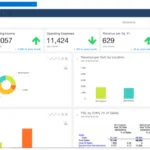AI in education represents a revolutionary paradigm shift, redefining traditional teaching methodologies and opening new frontiers in personalized learning. This article delves into the dynamic realm of AI in education, exploring its fundamental principles, diverse methodologies, key advantages, notable applications, and the challenges it addresses within the educational landscape.
Unveiling AI in Education
AI in education encompasses integrating artificial intelligence technologies to enhance and customize the learning experience. The primary goal is to leverage advanced algorithms and machine learning models to adapt educational content, personalize learning pathways, and provide students with tailored support. This intersection of technology and education is ushering in a new era of innovative pedagogy, transforming how students engage with academic content.
The Role of Machine Learning in Educational Personalization
Machine learning, a core component of AI, plays a pivotal role in educational personalization. Algorithms analyze vast datasets of student interactions, learning styles, and performance metrics to tailor educational content. This adaptability ensures that each student accepts a customized learning experience, addressing individual needs and fostering a more effective learning environment.
Natural Language Processing for Interactive Learning
Natural Language Processing (NLP) is another key facet of AI in education, enabling interactive and intuitive learning experiences. NLP technologies allow for the development of chatbots, virtual tutors, and language-processing tools that enhance communication between students and educational platforms. It fosters a more engaging and dynamic learning process, particularly in language acquisition and literacy development.
Predictive Analytics for Student Success
Predictive analytics, powered by AI, contributes to the identification of potential challenges and opportunities for student success. By analyzing historical data and student behaviors, predictive models can forecast academic performance and highlight areas where additional support may be beneficial. This proactive approach enables educators to intervene early, providing targeted assistance and fostering student success.
Advantages of AI in Education
Adopting AI in education brings many advantages, revolutionizing traditional learning methods and paving the way for more inclusive and effective learning environments.
Personalized Learning Paths
One of the primary advantages of AI in education is the capability to create personalized learning paths for each student. Machine learning algorithms assess individual strengths, weaknesses, and learning styles, tailoring educational content to meet the unique needs of each learner. This personalized approach enhances comprehension and student engagement.
Adaptive Assessments and Feedback
AI facilitates adaptive assessments that dynamically adjust to a student’s proficiency level. Through continuous analysis of responses, the system adapts to the difficulty of questions, ensuring assessments align with the student’s current understanding. Immediate feedback from AI-powered systems offers constructive insights, guiding students toward a deeper understanding of the subject matter.
Efficient Resource Allocation
AI optimizes resource allocation in educational institutions by automating administrative tasks and streamlining workflows. This efficiency helps educators to focus more on personalized instruction, mentorship, and addressing students’ individual needs, fostering a more supportive and enriched learning environment.
Inclusive Learning Experiences
AI promotes inclusive learning experiences by catering to diverse learning styles and accommodating various abilities. Adaptive technologies can support students with different learning paces or those who require alternative formats. This inclusivity ensures that education is accessible to a broader spectrum of learners.
Applications of AI in Education
AI finds diverse applications within the field of education, transforming traditional classrooms into dynamic and adaptive learning spaces that cater to the wants of individual students.
Intelligent Tutoring Systems
Intelligent Tutoring Systems (ITS) utilize AI algorithms to provide personalized and adaptive support to students. These systems analyze student performance, identify areas of difficulty, and offer targeted guidance and exercises to reinforce understanding. ITS contributes to improved student outcomes by providing tailored assistance in real time.
Gamification for Engaging Learning
AI-driven gamification enhances student engagement by incorporating game elements into educational activities. This approach leverages adaptive algorithms to adjust the difficulty of challenges based on individual progress, motivating students to actively participate in the learning process while enjoying a gamified and interactive educational experience.
Virtual and Augmented Reality in Education
Virtual and augmented reality technologies, enhanced by AI, offer immersive learning experiences. These technologies provide students with virtual simulations, field trips, and interactive 3D models that enrich the educational journey. AI algorithms contribute to creating realistic and adaptive virtual environments, making complex subjects more accessible and engaging.
Automated Grading and Feedback Systems
AI streamlines the grading process through automated assessment systems. Machine learning algorithms can explore and evaluate student submissions, providing instant feedback on assignments and assessments. It saves educators time and ensures timely and constructive feedback for students to enhance their understanding.
Challenges in AI Adoption in Education
Despite the advantages, integrating AI in education presents challenges that educators and institutions must navigate to ensure a seamless and effective implementation.
Digital Divide and Access Disparities
One significant challenge is the digital divide, where disparities in entry to technology and the internet may hinder the implementation of AI-driven educational tools. Bridging this gap requires efforts to provide equal access to technology for all students, ensuring that AI benefits reach diverse socio-economic backgrounds.
Ethical Use of Student Data
The ethical use of student data is a critical concern in AI-driven education. Safeguarding sensitive information and ensuring compliance with privacy regulations are essential to maintaining trust between educational institutions, students, and their families. Ethical guidelines and transparent data practices are crucial for responsible AI adoption.
Teacher Training and Professional Development
The successful integration of AI in education requires educators to be well-versed in these technologies. Teacher training programs must adapt to include AI literacy, enabling educators to leverage AI tools effectively, interpret data insights, and facilitate a seamless learning experience for students.
Future Trends in AI in Education
As technology continues to evolve, future trends in AI in education point towards even more advanced and adaptive learning experiences.
Continued Growth of Personalized Learning Platforms
The growth of personalized learning platforms is expected to continue, with AI evolving to provide even more tailored educational experiences. Adaptive learning algorithms will become more sophisticated, addressing individual learning styles and preferences and adapting in real time to student progress.
Integration of AI with Learning Analytics
Integrating AI with learning analytics will enable a deeper understanding of student behaviors and learning patterns. By leveraging AI-driven insights, educators can refine teaching strategies, identify areas of improvement, and create targeted interventions to enhance student learning outcomes.
Expansion of AI in Lifelong Learning
AI will likely play a significant role in lifelong learning, catering to individuals seeking continuous education. Adaptive learning platforms will offer personalized educational experiences for professionals and learners of all ages, supporting skill development and career advancement.
Collaborative and Social Learning with AI
AI will contribute to collaborative and social learning experiences. Intelligent systems will facilitate group interactions, peer-to-peer learning, and collaborative projects by analyzing social dynamics and adapting to the collective needs of learners, fostering a sense of community in digital learning environments.
Conclusion
AI in education is a transformative force, reshaping the learning and teaching methodologies landscape. Its ability to provide personalized, adaptive, and inclusive educational experiences heralds a future where education is not just a one-size-fits-all approach but a dynamic and tailored journey for each learner. While challenges persist, ongoing advancements and future trends indicate a promising and technologically advanced educational landscape, paving the way for innovative solutions and enhanced learning outcomes.





